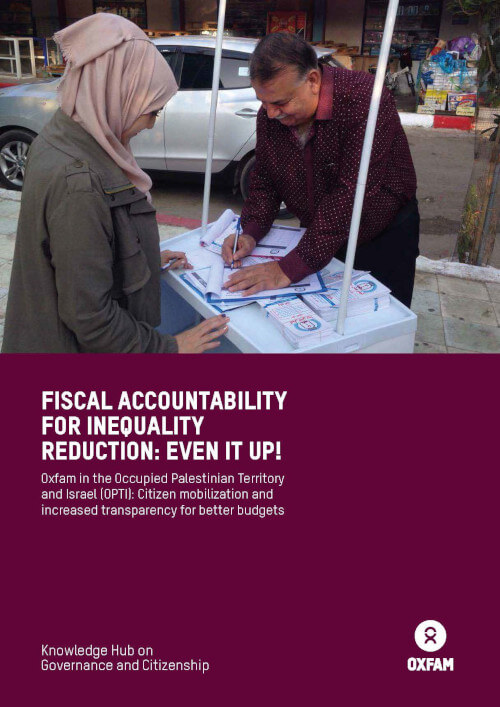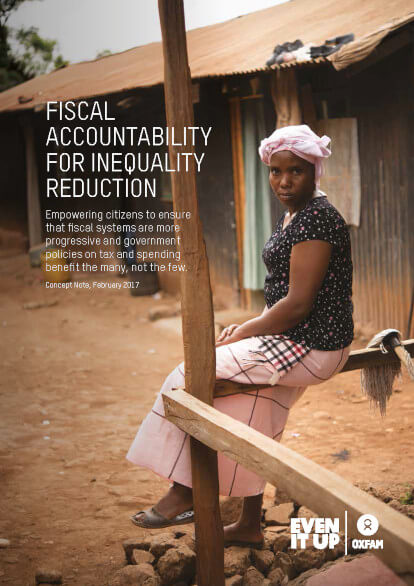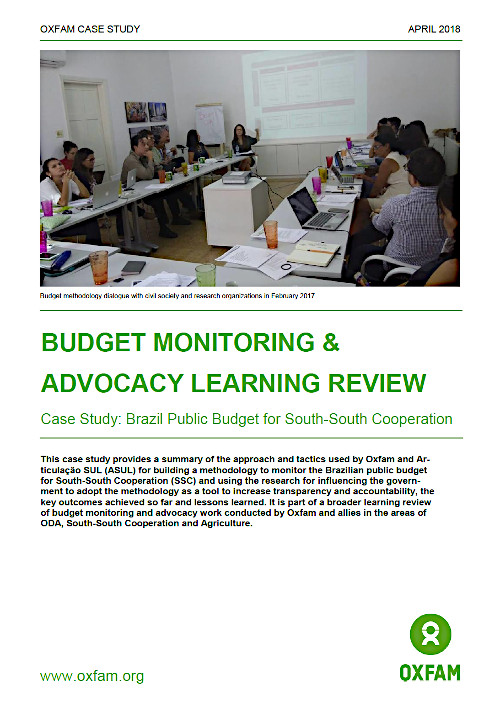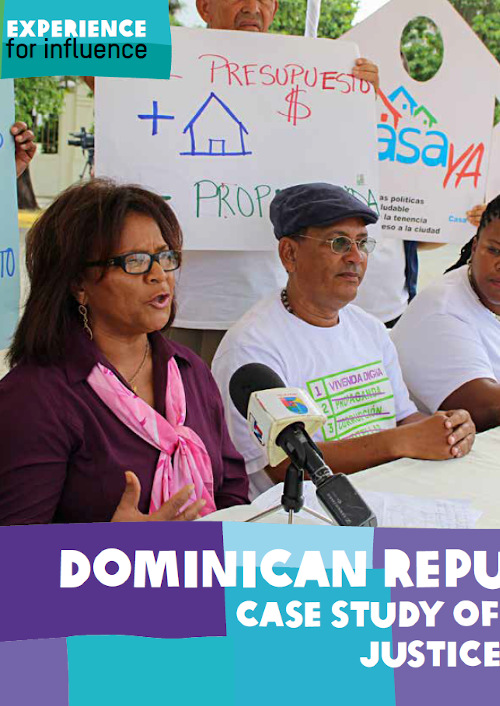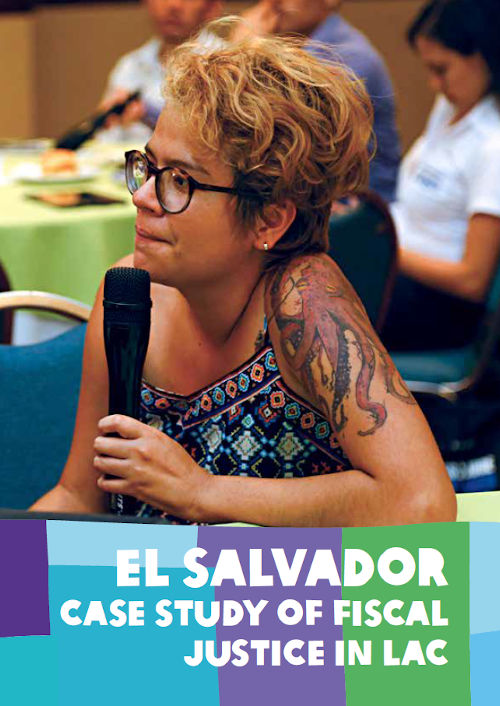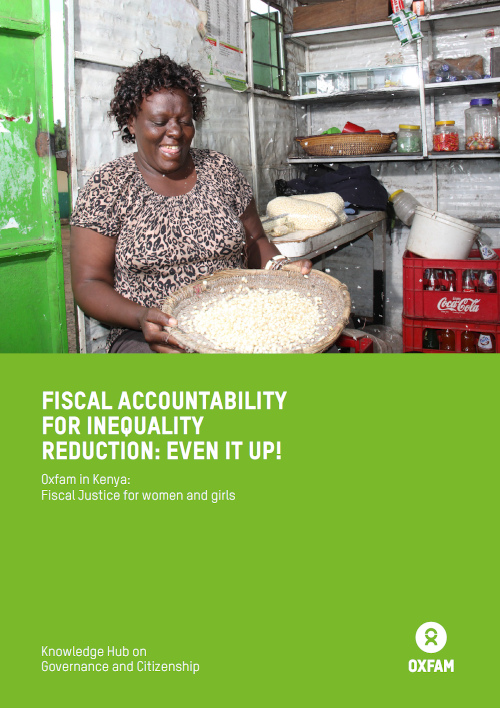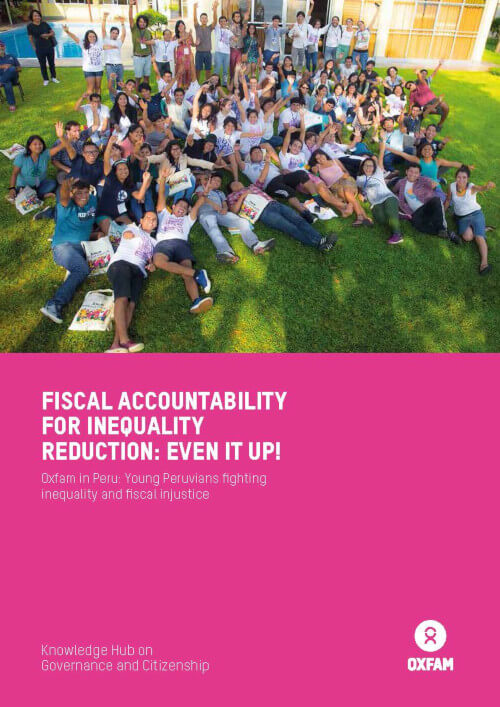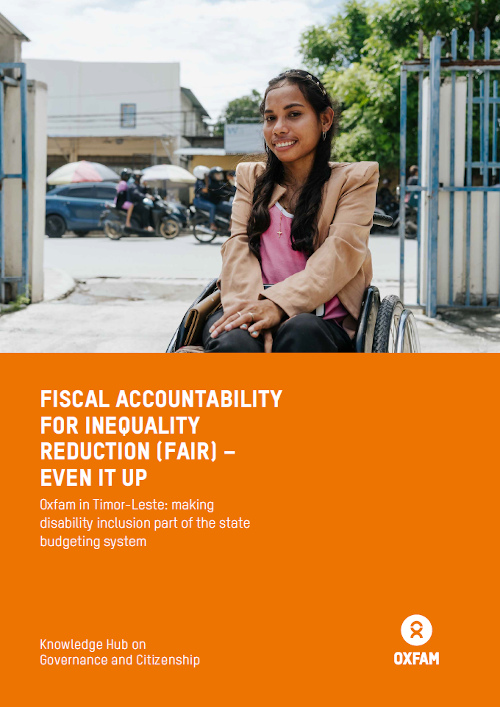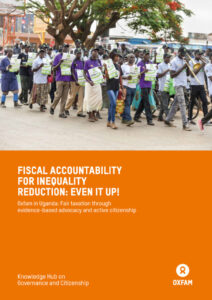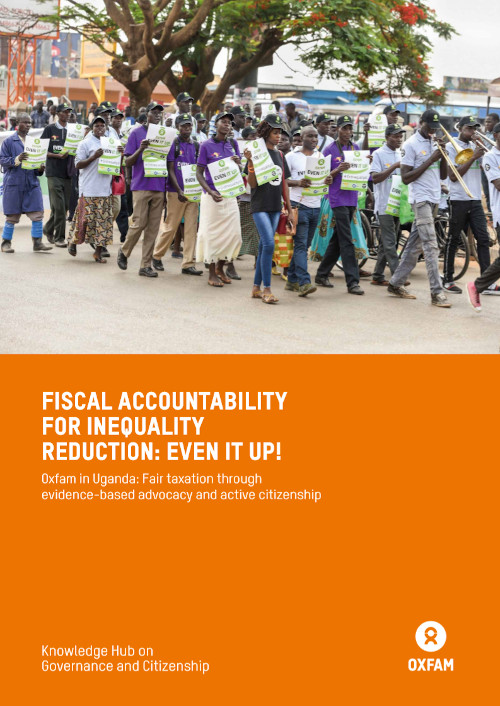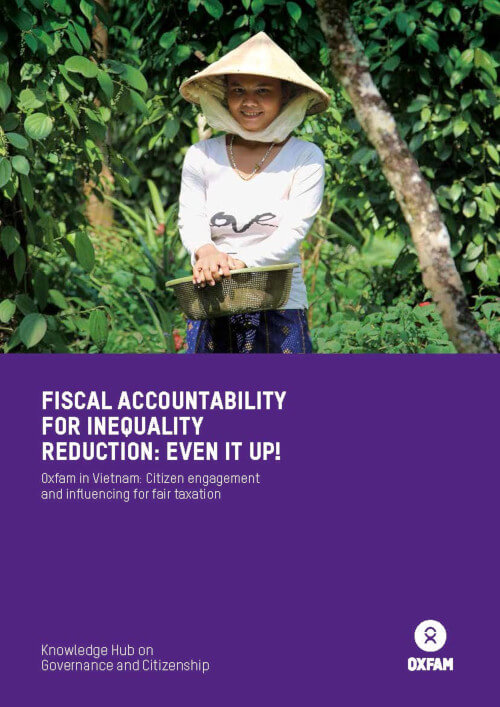For Oxfam, fiscal justice is about all people having the space, voice and agency to exercise their rights and influence the fiscal system – whatever their gender, class, religion, ability. We enable individuals, groups and communities to influence and monitor fiscal systems, mobilizing greater revenue and increasing spending on public services.
Fiscal justice is critical in addressing extreme inequality and poverty. More than technical tax or budget systems, it is about power, politics and support in the fight against inequality. Our vision puts active citizens and the civil society organizations at the heart of our approach – paying particular attention to commonly overlooked groups, and the barriers to their voices, issues and participation.
Oxfam’s Fiscal Accountability for Inequality Reduction – Even it Up! (FAIR-EiU) program unites the work of Oxfam and partners in over 40 countries. To find out more, download the concept note.
Here you can find the Track Record of Oxfam’s fiscal justice & inequality work including case studies, videos, and reports. These bring together our approach, impact and learning on fiscal justice in areas such as citizen engagement, social accountability, budget monitoring, tax and spending.
Featured country case studies are available in English, French and Spanish.
Agriculture Budget Advocacy in Ghana
In Ghana more than half the population depends on agriculture for their livelihood. In the last decade the government has made commitments to increase and improve agriculture spending and ensure that it supports female and male smallholder farmers.
Despite this, Ghana continues to lag behind in agriculture development and food security. Government spending priorities continue to be heavily influenced by income from oil and minerals, and receiving foreign aid, rather than building on farmers' and citizens' priorities and needs.
Partner organizations and Oxfam in Ghana are working together to improve agriculture budget allocations and policies and to create more opportunities for citizens to influence decision-makers. They are doing this through:
- joint evidence-based advocacy
- strengthening the capacity of citizens and journalists
- creating spaces for citizen engagement
- bringing the issue to a wider audience through media
- campaigning during public moments (e.g. elections)
These efforts have opened up space for civil society to engage with government on issues related to the agricultural budget and policies.
Lessons Learned
- Be creative in using political opportunities. The team was sharp enough to jump on opportunities indirectly associated with the agricultural budget to help them achieve their goals. For example, a multi-regional advocacy strategy during the 2016 election campaign resulted in a number of agriculture commitments and the 2013 Oil for Food campaign resulted in a commitment from the Government of Ghana to allocate a portion of the country's oil revenues to smallholder agriculture.
- The key to success lies in the way you partner. Oxfam in Ghana is partnering with a strong set of national and local organizations who engage in both agriculture and budget advocacy, and who work at the local level in Ghana. For the most part partner organizations play a leading role and Oxfam a supportive, less visible, role. This approach recognizes national and local partners' leadership and expertise and is more effective in advocacy with national authorities
- There is power in using traditional media and social media to attract attention. The key is to know which type of media to use for which audience, and to package messages in a way that your stakeholders can best use them. This could be by broadcasting radio shows with key information about your project, or by creating an infographic to share on social media.
- Plan some time for peer-to-peer learning exchange. Partners and Oxfam staff have a rich experience that should be shared across other teams and countries to improve agriculture advocacy efforts elsewhere. Plan for extra effort in documenting and sharing the lessons of the work through more traditional means (presentations, webinars, reports) as well as more creative mediums (e.g. videos and stories).
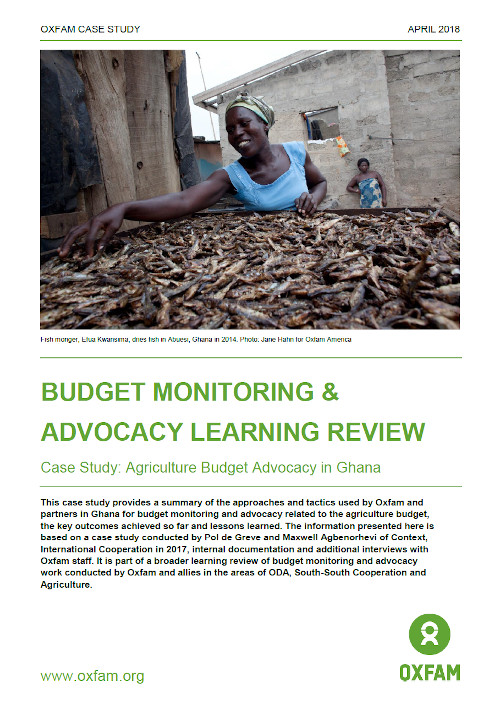
Improved fiscal governance through active citizenship
In Ghana citizen engagement is central to improving government transparency and accountability, all the more so after the financial crisis that followed the 2012 elections. In a country where 50% of the population is between 18 and 35 years old, young people are instrumental in creating change.
To get young citizens to engage in influencing policy change, the key to success has been music and culture! Through online and offline conversations including Ghanaian musicians and celebrities, youth are informed and encouraged to vote in a government that would work to reduce inequality in the country.
Oxfam and partners in Ghana are also working to increase the transparency and accountability of local and national governance. Through the now famous Shama model, citizens get to understand what their tax payment is contributing to and are able to have a say into budget allocations for local level development of their community. At the national level, a broad based civil society coalition has found a way to voice their recommendations to the government public finance management system using the IMF to build pressure.
This case study highlights the effective fiscal justice influencing for the Ghanaian government to set up a more progressive public finance management system, whilst working to increase active citizenship at the local and national level.
Lessons Learned
• Understanding the issues that matter to youth, the conversations they are interested in and their influences is helpful in connecting with this generation. Including pop-culture influencers in the civil society conversation about accountability and public finance management, drew young people into the debate. This enables a new generation of young active citizens to stand up in Ghana.
• Central to both the local and national level governance approaches are Ghanaian citizens themselves. They voice their needs, demand increased accountability of the government and are part of the development of their communities. Through organizing platforms for dialogue among citizens and government, Oxfam supports their voices being heard. Active citizenship is at the heart of this approach.
• Establishing a diverse strategic partnership (including civil society organizations, think-tanks and grassroots movements) has strengthened the call for greater accountability in Ghana. Standing together with a unified voice enables a strong, sustained dialogue between citizens and government. In this manner, we voice a continuous demand for accountability.
• Use global institutions and international influencing spaces as strategic levers for top-down pressure. The use of the IMF and World Bank influencing spaces in a multi-level civil society-led campaign with direct representation by citizens can lead to policy reform processes and implementation of improved fiscal responsibility at the national level.
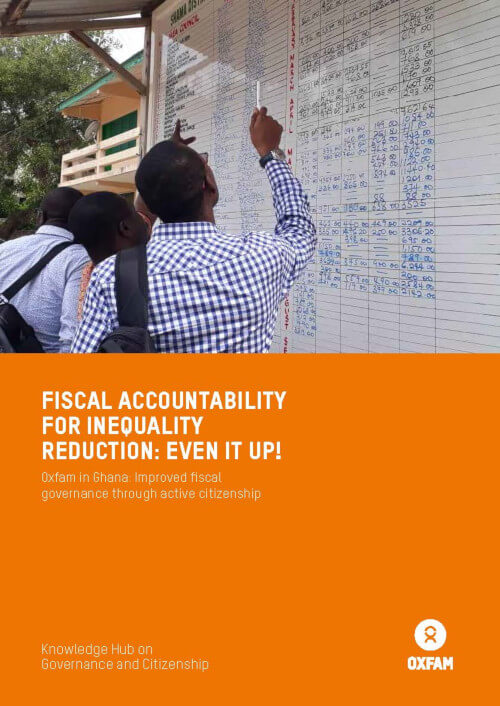
Citizen mobilization and increased transparency for better budgets
Citizen-led campaigning, capacity building of civil society, and engagement with different authorities and ministries has been at the heart of work over the past two years in the areas of tax, budgets and active citizenship in OPT. Together with MIFTAH, AMAN and ARIJ, Oxfam in the OPTI combines strategies on both the demand and supply side of the governance process; strong public campaigning to mobilize citizens on the one hand, and increasing transparency and accountability on governments’budgets for social services on the other.
This case study highlights the supporting and meaningful participation of citizens in government budget processes, and how citizens have amplified their needs and voice through a public campaign which rallied more than 42,000 people in Palestine.
Lessons Learned
- Flexibility is key. Even though it is important to plan your campaign, it eventually depends how your audience and the authorities respond to your campaign that determines in which shape or form you can continue. In the case of the Money 4 Medicine campaign, the greatest threat was its’ success. Because of the pushback, the team had to reassess and adjust the campaign.
- Considering the limited space for civil society organizations to operate in the OPT, it really helped that the issue of Money for Medicine was put central in the campaign, not Oxfam or the partner organizations behind it. No logos were used from any of the organizations. This provided the campaign team with the space to act, and citizens with space to engage with the topic.
- Cooperation between Oxfam and its’ Finance 4 Development partner organizations MIFTAH and ARIJ, with the different Ministries show that increased fiscal transparency is possible, and an important way to ensure that Palestinian national and local budgets are more responsive to the needs of the poor and the marginalized.
- Creating a positive track record of cooperating with a specific ministry can help in building relationships with other ministries as well. Showing that increasing citizens’ involvement in the budget process has helped the service delivery and the fiscal transparency of the ministry, as made it easier to engage with other Ministries as well.
